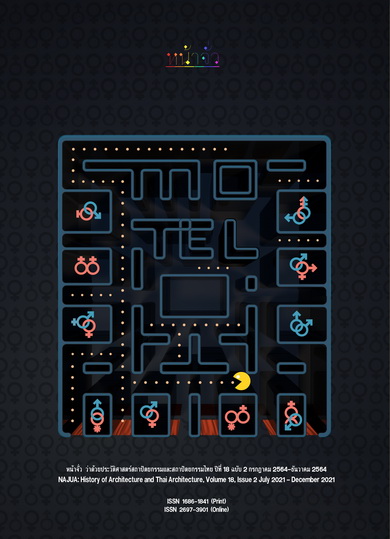Curtained Motel: Representations of Other Spaces in Thai Sex-gender Discourses
Main Article Content
Abstract
This research adopts Michel Foucault's “Other Spaces” theory as a leading conceptual framework to analyze the relationship between physicality and the social dimension of “curtained motels”. The research draws upon historical documents and related articles and the survey of “curtained Motels” in Muang district, Chiang Mai, including the interview with the owners. A total of six curtained motels were investigated and visualized through drawings as they represent multi-layered relationships between urban spaces, communities, and architectural scales. In Foucault's term, the research finding shows that “curtained motels” could be understood as “Other Space”. The curtained motel is an architectural representation of a specific building type regulated by law to become a motel where private space is invisible. The use of curtains to cover up hotel parking spaces is a crucial method of negotiating the law. Seen through the “Other Spaces” framework, “curtained motels” can be described as representing other sex-gender practices, excluded by the mainstream of hetero-normality, once peoples get in and the curtain is closed down. They could become a “haven” for those who wish to step away from the main sex-gender discourses. The motels offer the otherness to the architectural space, manifested through the curtain, the car, and the driveway. This research finding could expand the knowledge of architectural history and theory concerning curtained motels. Ultimately, it is a record of what happened on the areas of “curtained motels” that are rapidly changing and will eventually disappear in the future.
Downloads
Article Details

This work is licensed under a Creative Commons Attribution-NonCommercial-NoDerivatives 4.0 International License.
References
Foucault, Michel. “Of Other Spaces: Utopias and Heterotopias.” Translated by Jay Miskowiec. Architecture/Mouvement/Continuité, no.5 (October, 1984): 1-9. Accessed July 3, 2017, Available from foucault1.pdf (mit.edu)
Marsmag. Love Hotel, 2nd round of Motel. Accessed July 3, 2017. Available from https://m.mgronline.com/marsmag/app-detail-purchase/9580000024923
Minute report of Legislation Review Committee, 1st group, Ministry of Interior, 54th/2009, October 19, 2009. Accessed January 7, 2017. Available from http://law.moi.go.th/2552/12552101954n.doc
Sanders, Joel. STUD, Architecture of masculinity. New York: Princeton University of Architecture, 1958.
Sant Suwatcharapinan. “chūakhrāo rư̄ khāngkhư̄n talō̜t pai [Fantasized romanticity: A place for one night stand].” Journal of Social Sciences, Chiang Mai University 23, 1-2 (2011): 60.
Sarun Limsawaddiwong. Owner of S31 Sukhumvit Hotel. Interview, January 22, 2018.
Somchai Yensabai. “kānmư̄ang rư̄ang rāngkāi: kō̜ranī thammachāt khō̜ng khwāmrak nai phēt dīaokan [Body politics: A natural case of homosexuality].” Political Science Journal, Burapha University 21, 3 (1999): 301-328.
Supaporn Asadamongkoln. khwāmpen phūying khwām čhing māyā rư̄ ʻakhati nai sangkhom chāi pen yai [Feminine, fact, delusion or bias in patriarchy. Bangkok: Foundation for Women, 2011.
Theerayut Boonmee. Michel Foucault. Bangkok: vibhasa, 2008.
Virayudh Peesalee. Krung Thēp yām ratrī [Bangkok in the night]. Bangkok: Matichon, 2015.


